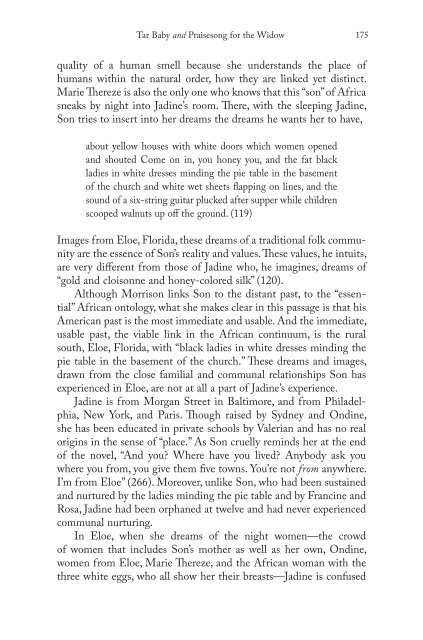Blooms Literary Themes - THE TRICKSTER.pdf - ymerleksi - home
Blooms Literary Themes - THE TRICKSTER.pdf - ymerleksi - home
Blooms Literary Themes - THE TRICKSTER.pdf - ymerleksi - home
You also want an ePaper? Increase the reach of your titles
YUMPU automatically turns print PDFs into web optimized ePapers that Google loves.
Tar Baby and Praisesong for the Widow 175<br />
quality of a human smell because she understands the place of<br />
humans within the natural order, how they are linked yet distinct.<br />
Marie Th ereze is also the only one who knows that this “son” of Africa<br />
sneaks by night into Jadine’s room. Th ere, with the sleeping Jadine,<br />
Son tries to insert into her dreams the dreams he wants her to have,<br />
about yellow houses with white doors which women opened<br />
and shouted Come on in, you honey you, and the fat black<br />
ladies in white dresses minding the pie table in the basement<br />
of the church and white wet sheets fl apping on lines, and the<br />
sound of a six-string guitar plucked after supper while children<br />
scooped walnuts up off the ground. (119)<br />
Images from Eloe, Florida, these dreams of a traditional folk community<br />
are the essence of Son’s reality and values. Th ese values, he intuits,<br />
are very diff erent from those of Jadine who, he imagines, dreams of<br />
“gold and cloisonne and honey-colored silk” (120).<br />
Although Morrison links Son to the distant past, to the “essential”<br />
African ontology, what she makes clear in this passage is that his<br />
American past is the most immediate and usable. And the immediate,<br />
usable past, the viable link in the African continuum, is the rural<br />
south, Eloe, Florida, with “black ladies in white dresses minding the<br />
pie table in the basement of the church.” Th ese dreams and images,<br />
drawn from the close familial and communal relationships Son has<br />
experienced in Eloe, are not at all a part of Jadine’s experience.<br />
Jadine is from Morgan Street in Baltimore, and from Philadelphia,<br />
New York, and Paris. Th ough raised by Sydney and Ondine,<br />
she has been educated in private schools by Valerian and has no real<br />
origins in the sense of “place.” As Son cruelly reminds her at the end<br />
of the novel, “And you? Where have you lived? Anybody ask you<br />
where you from, you give them fi ve towns. You’re not from anywhere.<br />
I’m from Eloe” (266). Moreover, unlike Son, who had been sustained<br />
and nurtured by the ladies minding the pie table and by Francine and<br />
Rosa, Jadine had been orphaned at twelve and had never experienced<br />
communal nurturing.<br />
In Eloe, when she dreams of the night women—the crowd<br />
of women that includes Son’s mother as well as her own, Ondine,<br />
women from Eloe, Marie Th ereze, and the African woman with the<br />
three white eggs, who all show her their breasts—Jadine is confused

















